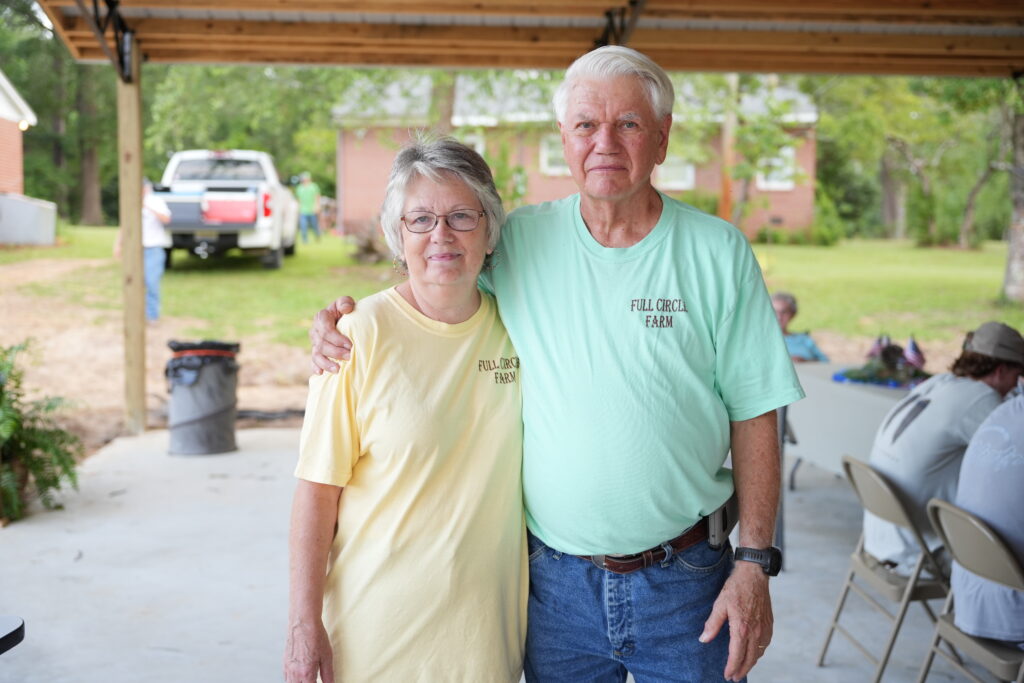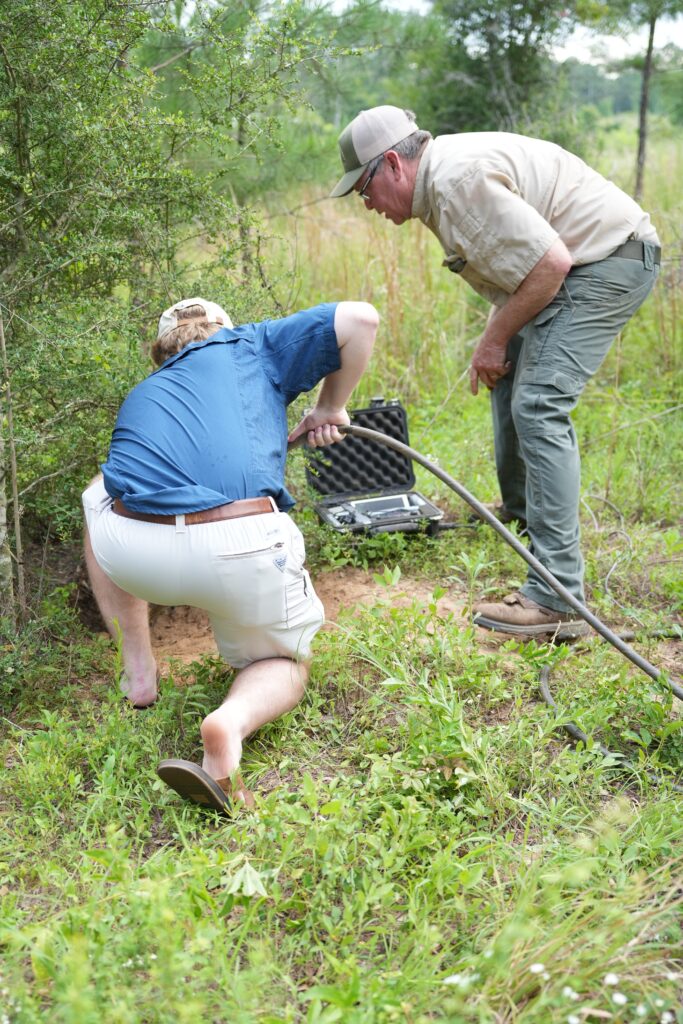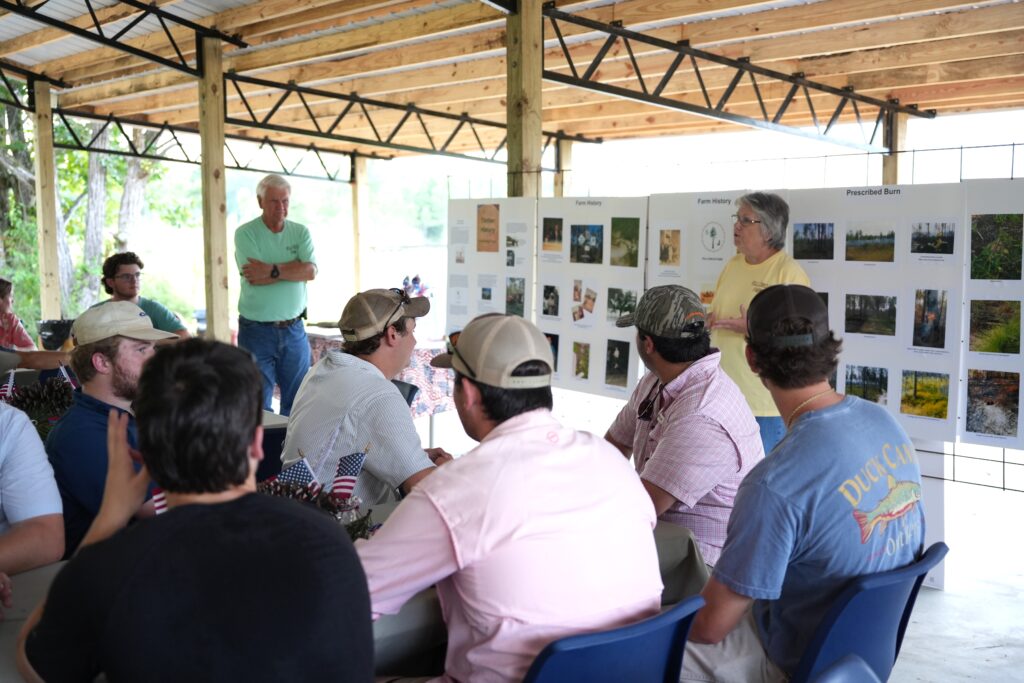
Gail and Phillip Jones are shown during a recent event held for Auburn forestry students at their property, Full Circle Farm, located in Andalusia, Alabama.
For the past 15 years, third-generation forest landowners, Gail Jones and her husband Phillip, of Andalusia, Alabama, have felt called upon to support and inspire Auburn University forestry students.
During the last weeks of the College of Forestry, Wildlife and Environment’s (CFWE) forestry practicum, held each summer at the Solon Dixon Forestry Education Center in Andalusia, the rising juniors visit the Joneses’ property for a landowner tour and dinner, breaking bread and gaining sage words of advice from landowners and agency pros that may likely shape their future careers.
Coming full circle
The Joneses’ property, located in western Covington County, not far from the Conecuh County line, aptly named Full Circle Farm, is a worthy place to establish and return to one’s roots.
The original 600-acre turpentine plantation purchased in 1921 by Gail Jones’ grandfather metamorphosed to row crops when he cleared the land to grow cucumbers and tobacco. Later, Jones’ father would inherit 400 acres of the farm. As the county district attorney and later a circuit court judge, he opted for a more minimal operation and chose to convert the property to cattle grazing. Growing up on the farm since the age of three, Jones considers it “home” and relished returning when she took ownership of a 166-acre parcel upon her parents’ passing in 1989.
“If you are gifted the gift of land, it is a gift of trust because that person trusted that you were going to take that land and make it the best it can be,” said Jones. “We all want that land to be better when we leave it, and that was true for us.”
And so began the couple’s journey as forest landowners. Inspired by their lifelong love of learning, Gail Jones, an educator, and Philip Jones, an accountant, have benefited from programs offered by Alabama Extension and the Alabama Forestry Commission (AFC). They also engaged other experts and forestry consultants for guidance, who helped the Joneses with their decision to preserve the property, returning it “full circle” to trees. Though they would find out through trial and error, the region’s sandy soil isn’t as conducive to growing loblolly pine, the preferred timber crop at that time.
A blessing in disguise
Years later, when Hurricane Ivan and Hurricane Dennis partially levelled the land, the harsh reality of severe weather and disease threatened to end their dream. But, owing to the hallmark resilience of multigenerational landowners, the Joneses adapted and overcame.
What was a tragedy turned out to be the impetus to plant longleaf, a species of pine that thrives in the coastal plains of southern Alabama—eventually, cutting back what remained of the loblolly and returning the property to 100% longleaf.
“I’ve always said, in a weird kind of way, those hurricanes were a blessing to us because we would never have had the nerve to clear-cut the loblolly and start over, and that helped us to make that decision to get it back to the way it should be,” said Gail Jones.
Not only were the Joneses challenged by the area’s intense climate and sandy soil, but over the years, the land has also fallen prey to cogon grass, brown spot needle blight and the appearance of Japanese climbing fern.
A team effort
Time and again, Jones states that Alabama Extension and the AFC provided knowledge and expertise to guide them. “We couldn’t do this without these agency people because they have the knowledge and expertise, and they’re so willing to share because they treat that property just like it was their own,” said Jones.
Another critical resource has been the relationship with various forestry consultants who helped the Joneses develop a customized management plan to support their unique goals and encouraged them to apply for various grants and programs.
“It has to be a partnership, it needs to be a team effort, because you can’t do this solo, you’ve got to have these people that have the expertise to guide you,” Jones said.
Recreation being one of their main goals for the property, the planting and management of the longleaf stands has fortuitously encouraged the return of several game species such as quail, turkey and deer. Longleaf is also the ideal habitat for the gopher tortoise, a keystone species whose network of burrows supports more than 350 other species, including the threatened and endangered gopher frog and eastern indigo snake.

Wildlife Biologist Ray Metzler instructs a forestry student as he scopes a gopher tortoise burrow at Full Circle Farm, a technique used for surveying the tortoises and other species inhabiting the burrows.
Through another agency-held program, the couple met Ray Metzler, at the time a wildlife biologist with the Alabama Department of Conservation and Natural Resources, who, after retirement, became a threatened and endangered species specialist with the AFC. At that meeting, Metzler appealed to the Joneses to consider participating in a fish and wildlife service program to survey gopher tortoise burrows.
“I could tell Mr. Jones wasn’t your typical landowner, and he was very knowledgeable about the Endangered Species Act and potential impacts to private landowners,” said Metzler. “But the Joneses were very open-minded and agreed to allow us to survey their property.”
After completing the survey, the team provided the gopher tortoise data to the Joneses, who shared the GPS coordinates with a timber company that marked and flagged each burrow to prevent them from being impacted during future harvesting operations.
“He has done a marvelous job helping us know exactly what to do and what not to do with the gophers, and they really are entertainment for me,” said Gail Jones. “We are blessed to still have these habitats that have been destroyed in so many places.”
Giving back and paying forward
The Joneses have a profound sense of gratitude to the people and agencies who have helped them over the years, and a growing concern that there is a dwindling pipeline of forestry professionals to assist small-scale private landowners like themselves.
This concern led Phillip Jones to propose an idea to his wife. He said, “We’re the only forestry committee with the Dixon Center in our backyard, and we’re not doing anything to encourage students. We need to do something. They come, and they get this wonderful hands-on experience, but we also need to recognize what they’re doing and to encourage them.”
Philip Jones, a member and now president of the Solon and Martha Dixon Foundation Board, reached out to Joel Martin, the newly hired director of Auburn University’s Solon Dixon Forestry Education Center, to propose their plan. During the final week of the CFWE’s summer forestry practicum experience, the pair agreed that Martin would bring the students to Full Circle Farm, where the couple could meet the students before the conclusion of the immersive nine-week program.
Martin feels it’s essential that the students understand the needs of private landowners, large and small, and appreciates that they can gain this perspective from their visit to the Joneses’ farm.

Gail Jones shares the history of Full Circle Farm with Auburn forestry students.
“Everything about a private landowner’s property is special to them, and that’s what these students have to realize,” said Martin. “It doesn’t matter if they own five acres or 5,000; that property is their heart and soul.”
During the last 15 years, the Joneses’ program has evolved to include a historical oration by Gail Jones and a tour of the Full Circle Farm gopher tortoise burrows with Ray Metzler, who teaches the students about wildlife conservation policies and techniques. Several of the Covington County Forestry Committee members are also present to discuss career skills with the students, emphasizing the importance of networking, good communication and accountability. After the program, the students play lawn games and enjoy a satisfying meal donated by the Joneses.
“They provide a unique opportunity for the students to learn from them, and the others that attend, including all of the friends and other citizen partners that they bring to the table,” said Metzler. “It really does provide a good opportunity to develop future students and future workers in the forestry field in Alabama.”
Indeed, the Joneses’ mission has come “full circle.”
Cooper Horn, a 2025 graduate of Auburn’s forestry program, who participated in the Joneses’ program only two years prior and again this year as a newly hired forester with the AFC, describes how valuable the experience is for students.
“I think what they’re doing is great. It’s a wonderful educational opportunity for the students to go out there and work with the landowners, to understand their perspective and their point of view, and especially with the gopher tortoise habitat as well,” said Horn.
During their brief time at Full Circle Farm, the students gain valuable advice and insights about their future forestry careers, and the Joneses hope they also appreciate the professional rewards and immense value of supporting the diverse goals of private forest landowners.
“We try to encourage them, but I guess they encourage us as well, because we see the future of what forestry can be and that they represent that hope,” said Gail Jones.
CFWE Emmett F. Thompson Dean Janaki Alavalapati is appreciative of the Joneses and feels that, during their brief time at Full Circle Farm, the students gain valuable insight.
“Each year, this visit inspires our students to recognize the professional fulfillment — and the lasting impact — that comes from serving small-scale forest landowners,” said Alavalapati.
“Further, the Joneses’ efforts are testimony to the transformative power of engaging CFWE’s deeply connected network of alumni, friends and stakeholders to elevate learning beyond the classroom and into the heart of real-world forest management.”
(Written by Jamie Anderson)









